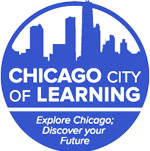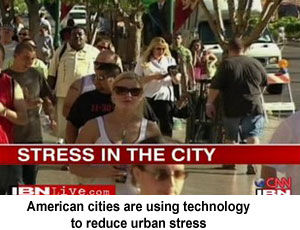
The City of Chicago has launched apps for residents to navigate their city

FRONT PAGE
About us
 

US cities and technology
Mayors in the USA

Worldwide | Elections | North America | Latin America | Europe | Asia | Africa |


 




 













|
|
American cities use knowledge
technology to reduce urban stress
By Tony Favro, USA Editor
6 July 2015: “Platform” is one of the current trendy words in American English. It is a generic term for the operating system of a computer. But it is also a metaphor for a stage upon which a person or an organization can rise above the commonplace and engage with people in a meaningful way. In the United States, the current fashion in public administration is to view local government as a platform, and progressive mayors as leaders who can build that platform. Based not on the traditional means of citizen participation — volunteerism, voting, public meetings — government as platform relies on technology to engage people. Its point of departure is the idea that data are a vital resource, which can empower people by allowing them to create their own solutions.
• Government data
• Engaged citizens
• Mayoral leadership
In the past few years, nearly 100 US cities have established offices or departments within city government dedicated to promoting innovation. With names like the Mayor’s Office of New Urban Mechanics (Boston), Open City (Chicago), and the Citizens Initiative for Technology and Innovation (San Francisco), these endeavors are seeking ways to make urban life less costly and less stressful. Generally, initial ventures have been modest, such as creating computer applications to help people find parking spaces, save energy, or locate an affordable apartment, but the promise is that many steps will eventually build on another to dramatically and positively transform local governance.
 Often, the municipal innovation centers are funded partially by private foundations. The Bloomberg Philanthropies fund Innovation Delivery Teams (“i-teams”) in 17 US cities. Evolving from former Mayor Michael Bloomberg’s reliance on data-driven solutions in New York City, the i-teams focus on resolving seemingly intractable inner city problems, such as crime reduction (New Orleans), poverty reduction (Rochester), and economic development (Memphis). Municipal innovation centers frequently partner with local businesses. Philadelphia, for example, works with a small firm to raise funds through crowd sourcing for specific civic projects. Often, the municipal innovation centers are funded partially by private foundations. The Bloomberg Philanthropies fund Innovation Delivery Teams (“i-teams”) in 17 US cities. Evolving from former Mayor Michael Bloomberg’s reliance on data-driven solutions in New York City, the i-teams focus on resolving seemingly intractable inner city problems, such as crime reduction (New Orleans), poverty reduction (Rochester), and economic development (Memphis). Municipal innovation centers frequently partner with local businesses. Philadelphia, for example, works with a small firm to raise funds through crowd sourcing for specific civic projects.
It’s a new ethos of public administration in which experimentation is encouraged and certain risks are acceptable. As Mayor Michael Nutter of Philadelphia says of his city’s efforts to innovate, “If you don’t fail, you’re not trying hard enough.”
The culture of innovation will likely expand to many more US cities. In June of this year, Google announced a Sidewalk Labs program, which, according to its media release, will “foster the development of technology products, platforms and infrastructure that… can be used to design communities that are more efficient, responsive and resilient.”
Government data
Data are the heart and soul of government as a platform, and cities in the United States took the lead in providing such data. In 2009, San Francisco became the first municipality in the US to pass an Open Data law requiring all city departments to make city data available to the public, as long as they didn’t violate privacy requirements. About 150 datasets were initially put online, and individuals and organizations soon used them to built scores of computer applications to serve immediate, real-time needs, such as finding the least-congested transport routes and nearest places to recycle household items. The data were also used to research trends and city performance in crime, public health, public works, and other city operations. Forty-five other US cities and counties subsequently passed similar open data legislation.
Open data received its biggest boost in 2013, when President Obama issued an executive order requiring federal data to be publicly available by default. The data must be presented to the public according to common standards and in machine-readable formats and with safeguards to prevent the release of sensitive and personally identifiable information.
More than 140,000 datasets currently reside on data.gov, the online repository for US federal data. The datasets are updated regularly and allow municipal officials, individuals, businesses, software developers, and others to make better-informed decisions and create consumer-friendly computer applications to help themselves and others.
Engaged citizens
Acting as if government were a platform built on huge amounts of open data carries several potential benefits. First, it taps into the energies and resources of individual citizens within the community. Second, it considers citizens a source of special insight, information, knowledge, and experience, which contributes to the soundness and legitimacy of solutions. Third, the solutions, like the data they are built upon, are open to everyone in the community. Fourth, just knowing that one can participate and share in the benefits of participation can foster dignity and self-sufficiency within the individual. Fifth, its transparency reduces the likelihood of community leaders making self-serving decisions. Sixth, its voluntary associations can reduce the costs associated with civic actions, allowing worthwhile projects to advance which otherwise might never be achieved. The overall result is an emphasis on entrepreneurial problem-solving to eliminate deficiencies in a community.
Not everything is rosy, however. While the individual learns how to make desired change in his or her life, it’s not entirely clear how acting as if government were a platform helps individuals understand group dynamics as it applies to diverse groups or learn how to resolve conflicting interests for the general welfare of the community. The underlying assumption is that an individual’s solutions to inconveniences in his or her life will benefit everyone in the community and that an analysis of big data will reveal hitherto hidden causes and correlations leading to new approaches to solving the big community problems—good health, education, and jobs, for example.
But the rhetoric of open data rarely expresses the principle of interdependence: that community life is enhanced when individual strengths are joined in a common purpose, that individual actions occur within a web of community relationships, that no one can do it all by him or herself. This was the core principal of earlier generations of community organizers in America who led civil rights, labor, feminist, and other transformational movements.
It’s also not clear how government as platform can effectively reach individuals who work for cash and do not own a mobile phone or internet connection or car home or charge card. These folk may not be captured by datasets and thus may be excluded from solutions created by those who are part of the mainstream.
Nor it is clear that analyses of big data can unravel the dense skein of unpredictable human behaviors that make cities what they are.
Mayoral leadership
It’s fair to say that most US cities are trying to improve operating efficiencies, reduce the direct and indirect costs of providing public services, and grow their economies. The big change over the past few years is that efficiency and growth are no longer seen as simply synonymous with cutting costs and regulations. Responsive, efficient, productive local government is becoming associated with entrepreneurial risk taking.
But civic entrepreneurship is also linked to a variety of other factors which are influenced to a large degree by old-fashioned personal leadership. It’s the city mayor, in consultation with the community, who ultimately must answer the crucial questions, which determine the direction of public administration: How can we establish and sustain conditions for effective community problem solving over time and across concerns? What level of risk can we confidently manage? What is success and how will we know it? It’s the mayor who must make sure data are used in ways that improve the community, who must drive home the message that all city residents and stakeholders are interconnected, that everyone has a responsibility to make the city good for all.
Two years ago the US Conference of Mayors established an Open Government Innovation Partnership to help US cities disseminate and use data. The goal is to get cities to share best practices about how technology and innovation can be leveraged to promote transparency, support a marketplace for entrepreneurship, and energize civic engagement and collaboration. The assumption is that innovation and technology will become a standard local government practice in the US.
After the novelty and glamour of technology and innovation wear off, perhaps we will view the current wave of newly-hired innovation specialists in American city governments as the latest generation of community organization practitioners. Like their predecessors, success will ultimately be measured by how effectively they help all of us better understand and improve the essential work of democracy, that is, people coming together to address issues that matter to them.
City mayors undoubtedly will be at center of change, engaging large numbers of people, in many different communities, in dialogue about shared concerns and collective action toward improvement.
|
|
|






























 Often, the municipal innovation centers are funded partially by private foundations. The Bloomberg Philanthropies fund Innovation Delivery Teams (“i-teams”) in 17 US cities. Evolving from former Mayor Michael Bloomberg’s reliance on data-driven solutions in New York City, the i-teams focus on resolving seemingly intractable inner city problems, such as crime reduction (New Orleans), poverty reduction (Rochester), and economic development (Memphis). Municipal innovation centers frequently partner with local businesses. Philadelphia, for example, works with a small firm to raise funds through crowd sourcing for specific civic projects.
Often, the municipal innovation centers are funded partially by private foundations. The Bloomberg Philanthropies fund Innovation Delivery Teams (“i-teams”) in 17 US cities. Evolving from former Mayor Michael Bloomberg’s reliance on data-driven solutions in New York City, the i-teams focus on resolving seemingly intractable inner city problems, such as crime reduction (New Orleans), poverty reduction (Rochester), and economic development (Memphis). Municipal innovation centers frequently partner with local businesses. Philadelphia, for example, works with a small firm to raise funds through crowd sourcing for specific civic projects.